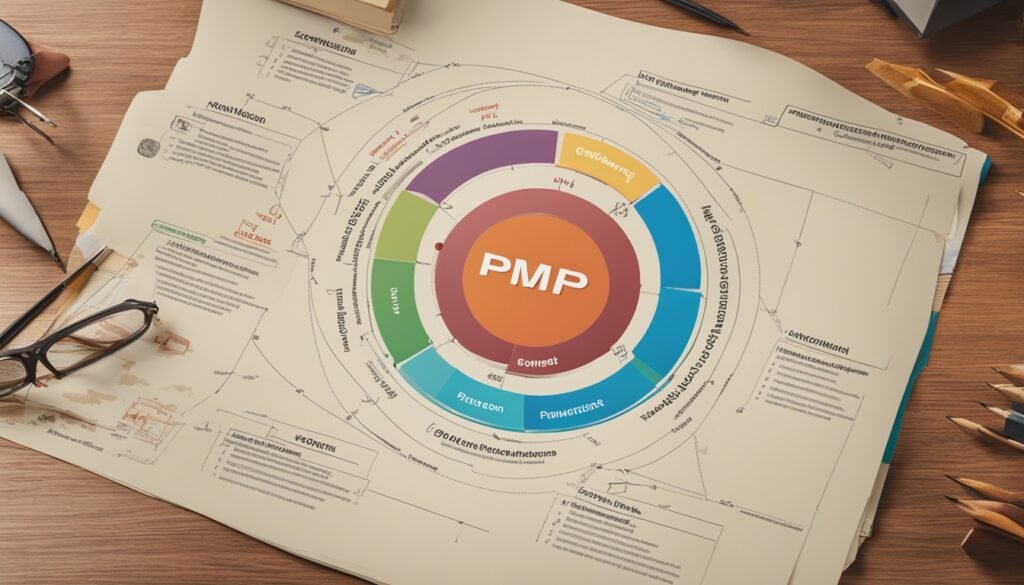The PMP (Project Management Professional) certification is a prestigious credential recognized globally for project management professionals. Passing the PMP exams is a challenging yet rewarding accomplishment that demonstrates expertise in leading and directing projects. This comprehensive guide will provide you with expert insights, proven strategies, and practical tips to help you successfully navigate the PMP exams and achieve your PMP certification.
Key Takeaways : PMP Exams
- The PMP certification is a globally recognized credential for project management professionals.
- Passing the PMP exams requires a comprehensive preparation strategy.
- This guide offers expert insights, strategies, and practical tips to help you succeed in the PMP exams.
- Understanding the PMBOK® Guide is crucial for PMP exam preparation.
- Leveraging additional study resources and practice tests can improve your chances of success.
Develop a Comprehensive PMP Exam Study Strategy
Developing a well-structured PMP exam study strategy is crucial for achieving success on the PMP certification exams. The first step in your preparation journey is to define your PMP exam study goals and create a roadmap to guide your preparation.
Define Your PMP Exam Study Goals and Create a Roadmap
Begin by clearly articulating your PMP exam study goals. What are you aiming to accomplish? Do you want to demonstrate your expertise in project management, advance your career, or meet a specific professional requirement? Once you have defined your goals, create a comprehensive roadmap that outlines the key milestones and tasks you need to accomplish to reach your PMP exam study objectives.
Allocate Sufficient Time for PMP Exam Preparation
Allocating sufficient time for your PMP exam preparation is essential. Typically, PMP exam candidates dedicate 2-3 months to comprehensive preparation, which includes reading the PMBOK® Guide, answering practice questions, and taking mock exams. By allocating adequate time, you can ensure that you have the necessary knowledge and skills to tackle the PMP exam successfully.
Establish a Consistent PMP Exam Study Routine
Consistency is key when it comes to PMP exam preparation. Establish a consistent study routine by dedicating specific days and hours each week to your PMP exam study activities. This may include reading the PMBOK® Guide, answering practice questions, and taking full-length mock exams under timed conditions. Maintaining a consistent study routine will help you build a strong foundation and develop the necessary expertise to excel on the PMP exam.
Mastering the PMBOK® Guide

The PMBOK® Guide, published by the Project Management Institute (PMI), is the primary reference material for the PMP exam. Understanding the importance of this guide and using it as the foundation for your preparation is crucial for achieving success.
Read and Reread the Guide Thoroughly
Thoroughly reading and rereading the PMBOK Guide is essential to grasp the concepts, knowledge areas, and processes that will be tested on the PMP exam. This deep understanding of the guide’s content will provide you with the necessary knowledge to navigate the exam effectively.
Familiarize Yourself with Knowledge Areas and Processes
Investing time to familiarize yourself with the PMBOK knowledge areas and the various processes within each area will equip you with a comprehensive understanding of project management principles. This holistic approach will enable you to apply your knowledge to the scenario-based questions commonly found on the PMP exam.
Leveraging Additional Study Resources

While the PMBOK® Guide provides the foundational knowledge, it is essential to supplement your studies with additional PMP exam preparation materials to ensure comprehensive preparation. These resources focus on the practical application of project management concepts and can include:
- Practice questions
- Online simulators
- Exam-oriented study guides
Practice Math Calculations and Critical Path Knowledge
Pay special attention to mastering the math calculations that are commonly tested on the PMP exam, such as:
- Earned Value Management (EVM)
- Critical Path Method (CPM)
These topics are crucial for demonstrating your understanding of project management concepts and your ability to apply them effectively. Dedicating time to practice these math calculations and critical path knowledge will help you feel confident and well-prepared for the PMP exam.
Maximize Your 35 Contact Hours of Project Management Training

One of the prerequisites for taking the PMP exam is 35 contact hours of project management education. Leverage this requirement to your advantage by using the PMP exam 35 contact hours of training sessions to build a strong foundation in project management principles and concepts. This will help you identify any areas that need more focus during your self-study for the PMP exam preparation training.
Build a Strong Foundation
The project management training for PMP sessions offer an excellent opportunity to solidify your understanding of project management fundamentals. Actively participate in the training, ask questions, and engage in discussions to deepen your knowledge of the PMBOK® Guide’s processes, knowledge areas, and tools. This foundational learning will serve as a robust starting point for your PMP exam preparation.
Refresh Your Knowledge Before the Exam
As you approach the PMP exam, revisit the materials and concepts covered during your 35 contact hours of PMP exam 35 contact hours training. This will help you identify any areas that require further review or reinforcement. By refreshing your knowledge just before the exam, you’ll be well-prepared to tackle the questions and demonstrate your mastery of project management principles.
PMP Exams: Mastering Practice Tests and Mock Exams
Incorporating practice tests and mock exams into your preparation strategy is essential for achieving success on the PMP exam. These resources not only help you familiarize yourself with the format, difficulty, and time constraints of the actual exam, but also provide valuable insights into your strengths and weaknesses.
Utilize Online Practice Questions and Simulators
Take advantage of the wealth of online resources available, such as practice question banks and exam simulators. These tools allow you to experience the PMP exam environment, answering a diverse range of questions that cover the key topics and concepts you’ll encounter on the real test. Regularly completing PMP exam practice tests and utilizing PMP exam simulators will build your confidence and help you identify areas that require further study.
Simulate the Exam Environment
To truly prepare for the PMP exam, it’s crucial to simulate the exam environment as closely as possible. Set aside dedicated time to take full-length practice tests under timed conditions, replicating the four-hour testing format and environment you’ll experience on exam day. This will help you build your stamina, improve time management, and become accustomed to the PMP exam environment.
Develop Time Management Strategies
One of the key challenges of the PMP exam is managing your time effectively. As you progress through your practice tests and mock exams, pay close attention to your pacing and identify strategies to optimize your PMP exam time management. This may involve techniques such as prioritizing questions, budgeting time for each section, and practicing quick calculations and analysis.
Strategies for Memorization and Understanding

Effective memorization and deep understanding of concepts are essential for the PMP exam. To master the material, divide your PMP exam study sessions into manageable chunks, such as 30-minute intervals, to improve retention. Focus on understanding the underlying PMP exam concepts and principles, rather than solely memorizing facts and formulas. This will enable you to apply your knowledge to the scenario-based questions on the exam.
Divide Your Study Sessions into Manageable Chunks
Splitting your preparation into smaller, focused study sessions can significantly boost your ability to retain information. By dedicating 30-minute intervals to specific topics or tasks, you can maintain concentration and maximize the effectiveness of your PMP exam memorization strategies.
Understand Concepts Instead of Memorizing
While rote memorization may seem like a quick fix, it is essential to prioritize understanding the fundamental PMP exam concepts over simply memorizing facts and formulas. By comprehending the underlying principles, you’ll be better equipped to apply your knowledge to the scenario-based questions on the exam, showcasing your true understanding of project management.
Mastering Inputs, Tools, Techniques, and Outputs (ITTOs)
One of the key areas of focus for the PMP exam is the Inputs, Tools, Techniques, and Outputs (ITTOs) associated with each project management process. Dedicate time to thoroughly understanding the relationships between these elements and how they work together to effectively manage projects. Mastering the PMP exam ITTO concepts will be crucial for your success on the exam.
Exam Day Preparation and Mindset

Proper preparation on the day of the PMP exam is just as important as your study efforts. Ensuring you are well-rested and mentally focused can make all the difference in successfully navigating the comprehensive PMP exam.
The PMP exam, administered by the Project Management Institute (PMI), is a rigorous assessment for aspiring Project Management Professionals. Preparing for the PMP certification exam involves comprehensive exam prep, including studying the PMBOK® Guide and taking practice exams. PMI requires 35 hours of project management training, which can be completed through online courses or authorized training partners. Aspiring candidates should apply for the PMP exam and utilize exam prep courses to enhance their project management skills. Practice questions and exam simulators are vital for understanding the exam content outline and methodology. Successful candidates demonstrate extensive project management experience and best practices, paving the way for a certified project management career.
Get a Good Night’s Sleep
Aim to get a good night’s sleep the evening before the PMP exam. Mental alertness and focus are crucial during the lengthy exam, and a well-rested mind will help you perform at your best. Avoid staying up late or engaging in activities that may disrupt your sleep cycle.
Arrive Early at the Test Center
Arrive at the PMP exam test center early, allowing ample time to check in and settle down before the exam begins. This will help you avoid any last-minute rush or stress, allowing you to enter the exam room with a calm and composed mindset.
Maintain a Positive and Focused Mindset
Approach the PMP exam with a positive and focused mindset. Visualize yourself successfully completing the exam, and trust in the knowledge and skills you have acquired during your preparation. Remain composed and focused throughout the exam, and avoid getting distracted by any external factors.
Post-Exam Reflection and Continuous Learning

After successfully completing the rigorous PMP exam, it’s essential to take time for reflection and continuous learning. Analyzing your performance and identifying areas of strength and improvement will help you enhance your project management skills and prepare for future professional growth.
A PMI-approved training course is essential to help candidates prepare for the PMP exam. PMI, which also offers the Agile Certified Practitioner certification, requires 35 hours of project management training. Becoming a PMI member provides access to valuable resources and exam discounts. Practice exams are a great way to gauge readiness and familiarize with the exam format, ensuring comprehensive preparation and boosting confidence for the certification process.
Analyze Your Performance
Reflect on your performance during the PMP exam by reviewing the areas where you excelled and the topics that presented challenges. Identify any knowledge gaps or areas that require further study. This self-assessment will provide valuable insights to guide your future continuous learning efforts for the PMP certification.
Celebrate Your Achievement
Earning the prestigious PMP certification is a significant accomplishment that demonstrates your expertise in project management. Take time to celebrate this PMP exam achievement and the hard work you’ve put into your preparation. Share your success with colleagues, family, and friends, as this milestone will open up new opportunities for professional development and career advancement.
Embrace Continuous Learning
The journey of a project management professional doesn’t end with the PMP exam. Embrace a mindset of continuous learning to stay up-to-date with the latest industry trends, best practices, and emerging technologies. Participate in ongoing training, workshops, or certified courses to further enhance your knowledge and skills. Engaging in a lifelong learning process will ensure you remain a valuable asset in the dynamic field of project management.
Studying for the PMP exam involves weeks of dedicated preparation, including taking PMP practice exams and enrolling in PMP training courses. The PMI administers this globally recognized certification, requiring 35 hours of project management training. Candidates can schedule their exam, which includes multiple-choice questions and takes four hours to complete. Utilizing a complete guide and online PMP prep resources, candidates create a study plan, understand the exam format, and take practice tests to improve their readiness. PMI-approved courses and frequent practice exams are essential for grasping key concepts and achieving certification success.
Also Read: TOEFL Exams Success: Study Plan And Practice Tests
Conclusion
The path to PMP certification requires dedication, discipline, and a comprehensive study strategy. By leveraging the insights and strategies outlined in this guide, you will be well-equipped to navigate the PMP exams and achieve your goal of earning the prestigious Project Management Professional (PMP) certification. Remember to stay focused, continuously learn, and celebrate your hard-earned success. Wishing you the best in your PMP exam journey!
The PMP exam conclusion of this guide summarizes the key elements necessary for your success. From developing a structured study plan to mastering the PMBOK® Guide and utilizing effective memorization techniques, this comprehensive resource has provided you with the tools and knowledge to excel in the PMP exam. Embrace the strategies presented, and you will be on your way to earning the respected PMP certification.
Continuous learning and self-improvement are essential for maintaining your expertise in project management. Even after passing the PMP exam, remain committed to expanding your knowledge and staying up-to-date with industry best practices. certification for project By embracing this mindset, you will not only strengthen your professional capabilities but also contribute to the ongoing growth self-paced online and development of the project management field is certified associate in project management. Congratulations on your dedication and perseverance – the PMP exam guide summary wishes you the utmost success in your PMP exam journey!
FAQs
Q: What is PMP exam prep?
A: PMP exam prep refers to the process of studying and reviewing the necessary materials to successfully pass the Project Management Professional (PMP) certification exam.
Q: How do I prepare for the PMP exam?
A: To prepare for the PMP exam, you can take an exam prep course, study the project management body of knowledge, practice with sample exams, and ensure you meet the required 35 hours of project management education.
Q: What is the PMP exam content outline?
A: The PMP exam content outline details the topics and areas that will be covered in the PMP certification exam, helping candidates understand what to study and focus on during their exam prep.
Q: Why is the 35 hours of project management education important for PMP exam preparation?
A: The 35 hours of project management education is a prerequisite set by the Project Management Institute (PMI) to ensure candidates have a foundational understanding of project management principles before taking the PMP exam.
Q: How can I best study for the PMP exam?
A: The best way to study for the PMP exam is to create a study plan, use study materials such as practice exams, review the PMP exam content outline, and consider taking an exam prep course to guide your preparation.
Q: What is the importance of practice exams in PMP exam preparation?
A: Practice exams are crucial in PMP exam preparation as they help candidates familiarize themselves with the exam format, assess their knowledge and readiness, and identify areas where they may need further study.
Q: How do I schedule my PMP exam?
A: To schedule your PMP exam, you can visit the PMI website or contact a PMI authorized training partner to arrange a suitable exam date and location based on your preparation and availability.
Q: What are frequently asked questions about PMP exam prep?
A: Frequently asked questions about PMP exam prep may include inquiries about study schedules, exam formats, recommended study materials, training courses, and how to best prepare for the PMP certification.
Source Links
- https://www.project-management-prepcast.com/kunena/pmp-exam-discussion/13369-pmp-examprepbook-based-on-7th-edition-which-is-best-to-buy-and-study
- https://projectmanagementacademy.net/articles/ten-things-remember-pmp-exam/
- https://www.project-management-prepcast.com/kunena/pmp-exam-lessons-learned/8778-step-by-step-guide-to-the-pmp-exam-hope-my-notes-help-someone-do-well





